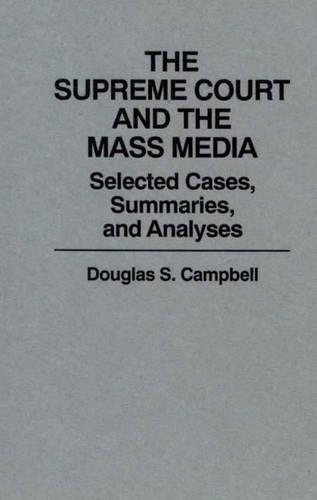
The Supreme Court and the Mass Media: Selected Cases, Summaries, and Analyses
(Hardback)
Available Formats
Publishing Details
The Supreme Court and the Mass Media: Selected Cases, Summaries, and Analyses
By (Author) Douglas S. Campbell
Bloomsbury Publishing PLC
Praeger Publishers Inc
19th July 1990
United States
Classifications
Tertiary Education
Non Fiction
Private or civil law: general
347.3072602643
Physical Properties
Hardback
248
Description
This book presents comprehensive summaries and clearly focused analyses of virtually all U.S. Supreme Court decisions on libel and privacy since 1964. The author goes beyond the obligatory outline and review of each case and presents the full arguments, often verbatim, of the justices. He presents each case in a broad based yet comprehensive summary allowing the reader to review and understand not just isolated and disjunctive points of law, but the case in its entirety. Covering such cases as the landmark Times v. Sullivan (1964) and the provocative and timely flag burning case of Texas v. Johnson (1989) this book is ideal for students of journalism, especially as a reference for courses in media law. Anyone interested in privacy and First Amendment issues will find The Supreme Court and the Mass Media a source of stimulating ideas. The case summaries are divided into six sections: historical background and legal context; immediate circumstances; narrative summary of the Court's opinion; ruling; narrative summary of concurring and dissenting opinions; significance of the case. The book places each case in its historical and legal context, often connecting particular issues to past and future decisions. More often than not the summaries of the decisions include the Court's own words allowing the reader an objective review.
Reviews
Campbell has compiled a series of briefs of major cases in the area of media law as well as some prominent cases that have shaped First Amendment law. The title is somewhat misleading; the book covers two areas of media law--libel and privacy--but other areas such as journalist privilege, access to information, and free press/fair trial are not included. Rather than providing succinct summaries of the major points of law, Campbell treats each case more thoroughly by including background information, concurrences, dissents, and significance. He provides generally reliable analyses of the cases and the law established as well as excellent short paragraphs on the significance of the case. These summaries should prove useful to students of media law. The volume is superior to J. Hemmer Jr.'s two-volume Communication Under Law (1979-80), which contains more cases but which lacks the depth found in Campbell's study. Mercifully, this book is free from the pro-press tendentiousness that characterizes too many of the texts used in media law courses. Well written; contains full-case index organized alphabetically and chronologically. Upper-division undergraduates and above.-Choice
"Campbell has compiled a series of briefs of major cases in the area of media law as well as some prominent cases that have shaped First Amendment law. The title is somewhat misleading; the book covers two areas of media law--libel and privacy--but other areas such as journalist privilege, access to information, and free press/fair trial are not included. Rather than providing succinct summaries of the major points of law, Campbell treats each case more thoroughly by including background information, concurrences, dissents, and significance. He provides generally reliable analyses of the cases and the law established as well as excellent short paragraphs on the significance of the case. These summaries should prove useful to students of media law. The volume is superior to J. Hemmer Jr.'s two-volume Communication Under Law (1979-80), which contains more cases but which lacks the depth found in Campbell's study. Mercifully, this book is free from the pro-press tendentiousness that characterizes too many of the texts used in media law courses. Well written; contains full-case index organized alphabetically and chronologically. Upper-division undergraduates and above."-Choice
Author Bio
DOUGLAS S. CAMPBELL is Chairperson of the Department of English, Journalism, and Philosophy at Lock Haven University, Pennsylvania. He is a contributor to numerous articles and books.
